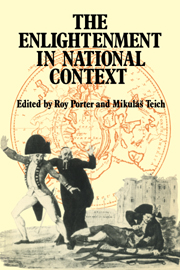Book contents
- Frontmatter
- Contents
- Preface
- 1 The Enlightenment in England
- 2 The Scottish Enlightenment
- 3 The Enlightenment in France
- 4 The Enlightenment in the Netherlands
- 5 The Enlightenment in Switzerland
- 6 The Italian Enlightenment
- 7 The Protestant Enlightenment in Germany
- 8 The Enlightenment in Catholic Germany
- 9 Reform Catholicism and Political Radicalism in the Austrian Enlightenment
- 10 Bohemia: From Darkness into Light
- 11 The Enlightenment in Sweden
- 12 The Russian Enlightenment
- 13 Enlightenment and the Politics of American Nature
- Afterword
- Notes to the text
- Further reading
- Index
1 - The Enlightenment in England
Published online by Cambridge University Press: 24 September 2009
- Frontmatter
- Contents
- Preface
- 1 The Enlightenment in England
- 2 The Scottish Enlightenment
- 3 The Enlightenment in France
- 4 The Enlightenment in the Netherlands
- 5 The Enlightenment in Switzerland
- 6 The Italian Enlightenment
- 7 The Protestant Enlightenment in Germany
- 8 The Enlightenment in Catholic Germany
- 9 Reform Catholicism and Political Radicalism in the Austrian Enlightenment
- 10 Bohemia: From Darkness into Light
- 11 The Enlightenment in Sweden
- 12 The Russian Enlightenment
- 13 Enlightenment and the Politics of American Nature
- Afterword
- Notes to the text
- Further reading
- Index
Summary
To approach the question of the Enlightenment in England means plunging into the quicksands of historical paradox. Throughout the eighteenth century Aufklärer of all nations revered English government, society and opinion as the pure crystal of Enlightenment. Anglophiles celebrated the British constitution, law and freedom, the open weave of English society, its religious toleration and prosperity. ‘The English are the only people upon earth’, asserted Voltaire, in his significantly titled Lettres philosophiques ou Lettres anglaises,
who have been able to prescribe limits to the power of Kings by resisting them; and who, by a series of struggles, have at last established that wise Government, where the Prince is all powerful to do good, and at the same time is restrained from committing evil; where the Nobles are great without insolence, tho’ there are no Vassals; and where the People share in the government without confusion.
Diderot envied his English confrères:
There seem to be two countries in Europe in which philosophy is cultivated, France and England. In England, philosophers are honoured, respected; they rise to public offices, they are buried with the kings. Do we see that England is any the worse for it? In France warrants are issued against them, they are persecuted, pelted with pastoral letters, with satires, and libels.
Hence Aufklärer set up a kind of society for the propagation of the English gospel.
- Type
- Chapter
- Information
- The Enlightenment in National Context , pp. 1 - 18Publisher: Cambridge University PressPrint publication year: 1981
- 16
- Cited by



